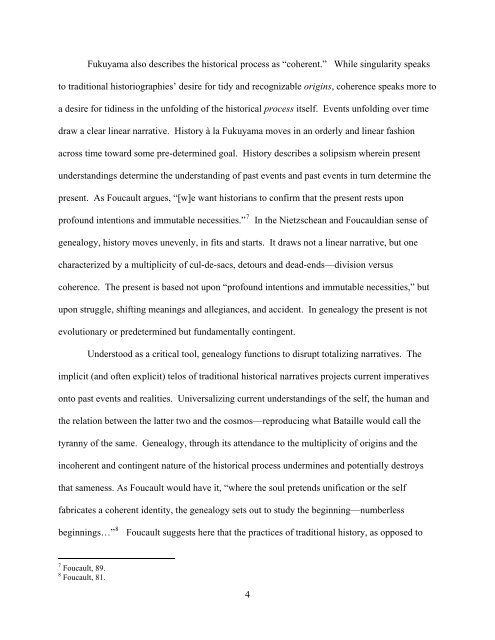A Genealogy of the Extraterrestrial in American Culture
A Genealogy of the Extraterrestrial in American Culture
A Genealogy of the Extraterrestrial in American Culture
Create successful ePaper yourself
Turn your PDF publications into a flip-book with our unique Google optimized e-Paper software.
Fukuyama also describes <strong>the</strong> historical process as “coherent.” While s<strong>in</strong>gularity speaks<br />
to traditional historiographies’ desire for tidy and recognizable orig<strong>in</strong>s, coherence speaks more to<br />
a desire for tid<strong>in</strong>ess <strong>in</strong> <strong>the</strong> unfold<strong>in</strong>g <strong>of</strong> <strong>the</strong> historical process itself. Events unfold<strong>in</strong>g over time<br />
draw a clear l<strong>in</strong>ear narrative. History à la Fukuyama moves <strong>in</strong> an orderly and l<strong>in</strong>ear fashion<br />
across time toward some pre-determ<strong>in</strong>ed goal. History describes a solipsism where<strong>in</strong> present<br />
understand<strong>in</strong>gs determ<strong>in</strong>e <strong>the</strong> understand<strong>in</strong>g <strong>of</strong> past events and past events <strong>in</strong> turn determ<strong>in</strong>e <strong>the</strong><br />
present. As Foucault argues, “[w]e want historians to confirm that <strong>the</strong> present rests upon<br />
pr<strong>of</strong>ound <strong>in</strong>tentions and immutable necessities.” 7<br />
In <strong>the</strong> Nietzschean and Foucauldian sense <strong>of</strong><br />
genealogy, history moves unevenly, <strong>in</strong> fits and starts. It draws not a l<strong>in</strong>ear narrative, but one<br />
characterized by a multiplicity <strong>of</strong> cul-de-sacs, detours and dead-ends—division versus<br />
coherence. The present is based not upon “pr<strong>of</strong>ound <strong>in</strong>tentions and immutable necessities,” but<br />
upon struggle, shift<strong>in</strong>g mean<strong>in</strong>gs and allegiances, and accident. In genealogy <strong>the</strong> present is not<br />
evolutionary or predeterm<strong>in</strong>ed but fundamentally cont<strong>in</strong>gent.<br />
Understood as a critical tool, genealogy functions to disrupt totaliz<strong>in</strong>g narratives. The<br />
implicit (and <strong>of</strong>ten explicit) telos <strong>of</strong> traditional historical narratives projects current imperatives<br />
onto past events and realities. Universaliz<strong>in</strong>g current understand<strong>in</strong>gs <strong>of</strong> <strong>the</strong> self, <strong>the</strong> human and<br />
<strong>the</strong> relation between <strong>the</strong> latter two and <strong>the</strong> cosmos—reproduc<strong>in</strong>g what Bataille would call <strong>the</strong><br />
tyranny <strong>of</strong> <strong>the</strong> same. <strong>Genealogy</strong>, through its attendance to <strong>the</strong> multiplicity <strong>of</strong> orig<strong>in</strong>s and <strong>the</strong><br />
<strong>in</strong>coherent and cont<strong>in</strong>gent nature <strong>of</strong> <strong>the</strong> historical process underm<strong>in</strong>es and potentially destroys<br />
that sameness. As Foucault would have it, “where <strong>the</strong> soul pretends unification or <strong>the</strong> self<br />
fabricates a coherent identity, <strong>the</strong> genealogy sets out to study <strong>the</strong> beg<strong>in</strong>n<strong>in</strong>g—numberless<br />
beg<strong>in</strong>n<strong>in</strong>gs…” 8<br />
Foucault suggests here that <strong>the</strong> practices <strong>of</strong> traditional history, as opposed to<br />
7 Foucault, 89.<br />
8 Foucault, 81.<br />
4















